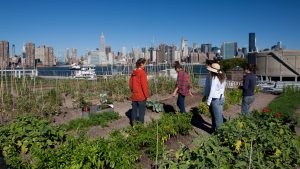Whole foods are essential for health and well being; however, even some “whole” foods lack valuable nutrients based on where and how they’re grown. Pollan points out that there has been “a decline in nutrient content of…forty-three crops…tracked since the 1950s” (118). The industrialization of farming has created a nutrient-deficient world, even for those who attempt to eat in the holistic ways of our ancestors. How can we know what is truly best? And for those with limited resources, how can these issues even begin to be addressed?
The trend of individual professional farming, particularly in more urban settings, creates opportunity to reverse some of the negative consequences of the industrialization of food (Wheat). No longer is there “no future in farming,” as was the perception Beth Wheat had growing up. For example, the increasing popularity of the University of Washington farm is creating access for students to learn successful farm function and operation, and many are taking on farming professionally.
Although there is additional work to be done to address the systemic issues around the current food and diet crisis, Ms. Wheat’s work in providing fresh, healthy, local produce in CSAs to the community, creating jobs, and supporting the local economy is valuable. And her farm’s participation in the local farmer’s market, allowing the community to access more nutritious whole foods than available at the grocery, is significant. In fact, one of Pollan’s strongest recommendations is to support local farmers at “one of the fastest-growing segments of the food marketplace” (158), thereby eliminating the long supply chain, creating direct knowledge of food source, gaining more health benefits, rediscovering culture, supporting local community, and shunning the industrial status quo.
How can these ideas be spread and promoted in areas of the country that are experiencing the most adverse affects from industrialized food? How can local farm-sourced food become the new normal, again?
Sources
Pollan, Michael. In Defense of Food: An Eater’s Manifesto. New York: Penguin Press, 2008. Print.
Wheat, Beth. Interview with Dr. Karen Litfin. Date Unknown.
Image: PBS.org

